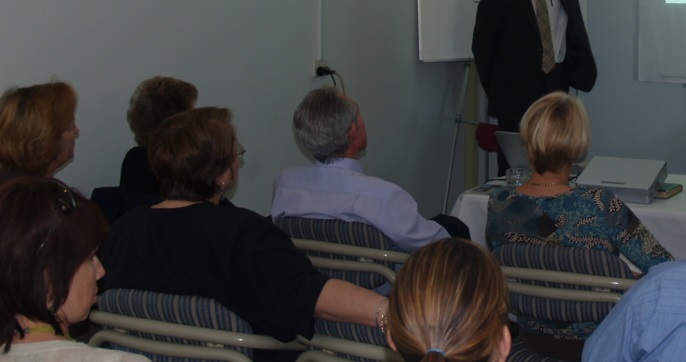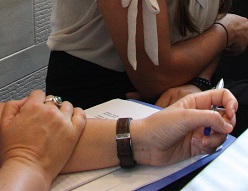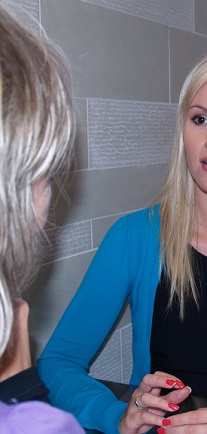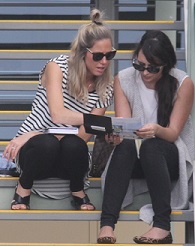Improve your classroom skills by distance learning.
- Understand more about the teacher/learner relationship.
- Improve your communication skills within the classroom with this distance learning course in classroom delivery skills.
- Start at at any time, study in your own home or where you want to.
What do our students say about the course?
" I have never found the staff at any other learning institution as supportive as the staff at ACS. This gives one a lot of peace of mind and confidence to go on - at every squeak from my side, you guys have always been there, immediately to sort me out. The feedback on my lessons has always been really good and meaningful and an important source of my learning. Thanks!..."
- Student with ACS
Delivering Effective Education
There are many factors that influence the effectiveness of education: the curriculum; the information that is included or excluded; the skills and knowledge that the student begins with; choice of physical resources; delivery techniques; the student’s commitment and aptitude; and the teacher’s teaching abilities.
Of overriding significance, however, is the teaching-learning relationship that develops between student and teacher, and that depends to a great extent on how they communicate with each other. Regardless of ability, if the teacher cannot communicate effectively to facilitate and encourage learning, the content of a course or training session will simply not be absorbed as intended. On the other hand, learning is improved when the student is able to communicate his/her needs and understanding.

For successful learning to occur, we require two key human factors:
- An interested, receptive student who can communicate in ways that meet their learning needs.
- A teacher who can communicate the required information in a way that is responsive to the needs of the student, and that promotes student learning.
Course Structure and Lesson Content
There are 8 lessons in this course:

Lesson 1. Interpersonal Communication in Education
- Basic principles of communication
- Verbal and non-verbal communication
- Factors affecting communication
- Self-awareness and communication
- Reactive patterns
- Intentions
- Teacher student ratios
- Factors affecting communication in a classroom
- Student diversity
- Student expectations
- Teacher's needs and expectations
- Society and culture
- Communication and education approaches
- Teacher-centred and student-centred learning
- Verbal skills for classroom teaching
- Questioning skills
- Lecturing or giving a talk
- Elements of lecturing
Lesson 2. Listening Skills
- Stages of listening
- Key elements of listening in a classroom
- Obstacles to listening
- Anxiety
- Hearing
- Lack of interest
- Bias
- Selective attention
- Negativity
- Listening skills
- Active listening
- Empathic listening
- Responding to received communications
Lesson 3. Understanding Motivation
- What is motivation
- Variables of motivation
- Theories of motivation
- Maslow's theory of motivation
- Motivations
- Primary motivator, Unlearned motivators
- Secondary or learned motivators
- Motivation and anxiety
- Motivation and distress
Lesson 4. Motivational factors
- Incentives
- Internal and external incentives
- Relational nature of incentives
- Enhancing intrinsic motivators
- Social reinforcers as incentives
- Influence of groups on individual motivation
- Social loafing
Lesson 5. Applying Motivation to Education
- Motivation and goals
- Expectations
- Vicious and virtuous cycles
- Practical applications
- Assessing a person's current situation
- Dealing with emotions
- Identifying existing barriers to learning
- Establishing goals and priorities
- Locating and applying useful resources
Lesson 6. Stress Management
- Flight or fight response
- Long term problems
- What happens when a person is stressed
- Stress management program
Lesson 7. Conflict Management
- What is conflict
- Conflict handling techniques
- Anger
- Dealing with anger in others
- Modifying anger
- Role play and conflict management
Lesson 8. Mediation and Negotiation
- What is negotiation?
- Establishment groups
- Community groups
- Joint problem solving approach
- Effective negotiating behaviour
- Mediation
- Mediator's responsibilities
- Facilitation
- Attributes of a good facilitator
- Balance of power
- Power imbalance
- Group work and discussion
- Conflict training exercises.
Each lesson culminates in an assignment which is submitted to the school, marked by the school's tutors and returned to you with any relevant suggestions, comments, and if necessary, extra reading.
Course Aims
- Explain the role of communication between individuals in optimising the benefit of education.
- Describe and use strategies to improve listening in order to correctly understand what another person is communicating to you.
- Explain motivation as a factor in the teaching-learning situation and in the cultivation of an inquisitive approach to learning.
- Select and cultivate motivational factors appropriate to particular classroom situations.
- Describe practical techniques which can be used by an educator to motivate their students.
- Describe practical techniques that can be used by an educator for managing their own stress, and also assisting students in stress management.
- Identify, analyse and devise methods for dealing with conflict in an education setting.
- Explain how to apply practical techniques to facilitate mediation in conflict situations in an educational setting.
Course Duration: 100 hours of self paced study.
What is Education?

If you look hard enough, you can find an endless variety of definitions for education. Some are enlightening, but many are based upon only a partial understanding or a biased perspective.
The general population may think of education as being the same thing as schooling, but a developmental psychologist may have a much more complex definition.
Attending a course is not in itself learning though.
When someone is exposed to a new idea, concept, information or skill; certain information will enter the body and be stored in a person's short term memory.
This is like any data entry into a computer, which can be read and processed while the computer is swiched on; but unless that data is saved before the computer is closed down, it will not be able to be recalled at a later date. Real learning required the data to not only go into short term memory; but it also needs to be saved or embedded solidly in memory so that it does not fade or disappear at a later date. It needs to go into long term memory.
It is possible to take information into short term memory; and pass an exam before it is lost.
Proper education however is more permanent.
Any effective education required learning and embedding what is learned into long term memory. This is not a process that can be fat tracked. Some people may learn faster than others; but proper learning for everyone is more than just encountering and understanding information then moving on.
Academics and researchers have pondered the meaning of education for a long time. One particularly significant model is "David A. Kolb’s Theory of Experiential Learning".
In 1984, American education theorist David Kolb published work underpinning theories in experiential learning, learning styles dimensions and later he published work calling it a learning style inventory.
Kolb’s theory is mainly concerned with the internal cognitive processes of the learner. He stated experiential learning is knowledge relating to, or resulting from, experience. He argued that learning is the acquisition of abstract concepts that can then be applied to new situations in a flexible way.
Kolb stated “Learning is the process whereby knowledge is created, through the transformation of knowledge. Knowledge results from the combination of grasping experience and transforming it.” He identified that there are two very different activities involved in the learning processes:
Perception

People perceive things in different ways. Some people learn effectively by using their physical senses, such as hearing, seeing, smelling, touching or feeling, which is largely via the senses and hands on experiences. Others may better perceive something in a more abstract way through mental or visual conceptualisation. For example, Claire may learn well by recording her notes and listening to them in audio form, whilst Jake may find that they learn best by writing down his notes over and over again. Bob may learn best by simply reading a book, whilst Barbara may require a mixture of visual and audio notes.
Processing
Once something is perceived, it needs to be processed. Again, different people prefer to process it different ways (e.g. some by application, or doing something tangible with the information, others simply by thinking about it).
Kolb argued there were six main characteristics to experiential learning. So learning is:
- A continuous process that is grounded in experience.
- Best considered as a process, rather than considering in terms of the outcomes.
- A holistic process of adapting to the world around us.
- Involved with transactions between the environment and person.
- The process of creating knowledge as a result of the interaction between personal and social knowledge.
- The resolution of conflict between conflicts of opposed modes of adaption.
Learning is full of tension due to the conflicts involved with the process of learning.
The Four Stage Experiential Learning Cycle
Kolb’s experiential learning theory works on two levels which are:
- The four learning styles (dimensions).
- The four stage learning cycle
His experiential learning style theory is represented as a four stage learning cycle. In the cycle the learner will cover all areas. So for effective learning, the person progresses through the four stages and may repeat it. These are:
Concrete Experience (Feeling)
This involves the student having an experience or doing something; and learning through that experience. A concrete experience is achieved through being sensitive to communications and feelings of others.
Reflective Observation (Watching)
This learning occurs when the student reflects on or reviews and experience they underwent. Through self examination and consideration of the experience, in different contexts, the student grows their understanding of that experience. The meaning of the experience can then be reinforced and broadened.
Abstract Conceptualisation (Thinking)
Here a student learns by carrying out a logical analysis of the learning event. In doing so an intellectual understanding of any situation can develop, and that process reinforces and embeds what is learned.
Active Experimentation (Doing)
Learning occurs here by putting short term learning into practice; and by doing so, expanding, deepening and reinforcing the learning.
Learning occurs from both mistakes and successes by taking risks and doing things.

If you want Real Learning
If you want an effective education where you learn properly, and retain what you learn; you need to undertake courses that take time, are constructed and delivered by people who understand learning, and provide the guidance for you to encounter, understand, process, reinforce and retain what you study. When this happens, education makes a positive change in your life and your capacity to do things for the rest of your life (and not just long enough to pass an exam).
Our courses do this
This and all of our other courses are "experiential based learning". If this is what you want, we can help.
Our courses are all studied by distance learning. They are available to start at any time. In addition to high quality course materials, you will also receive expert guidance and support from our highly knowledgeable tutors.
You can enrol on this course today.
If you have any questions, please get in touch. Phone us on (UK) 01384 442752, or (International) +44 (0) 1384 442752, or use our FREE COURSE COUNSELLING SERVICE.